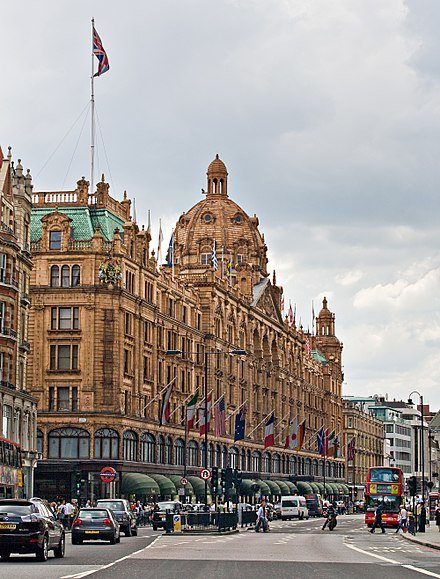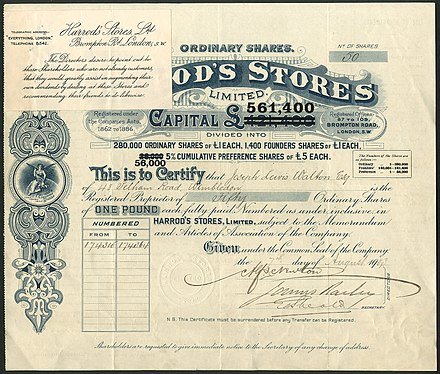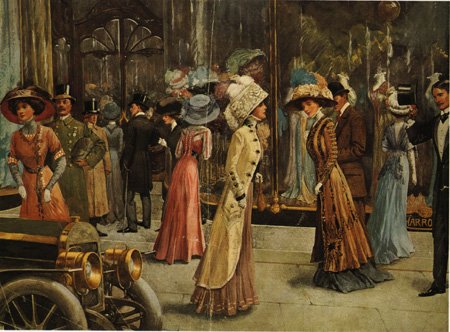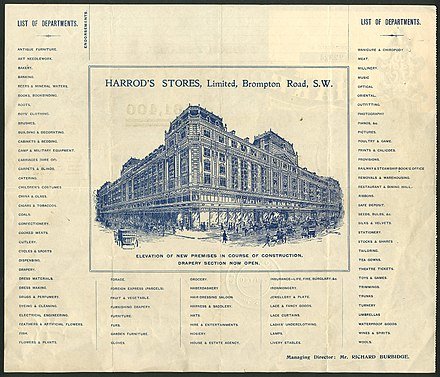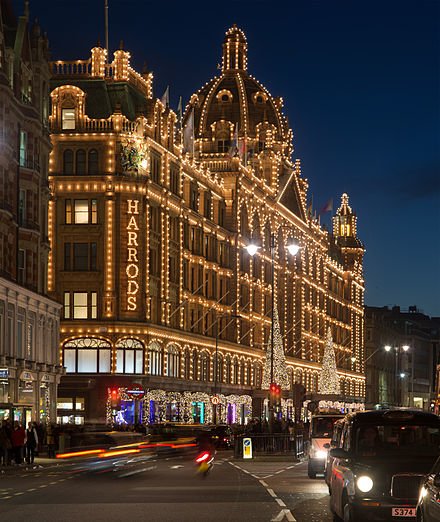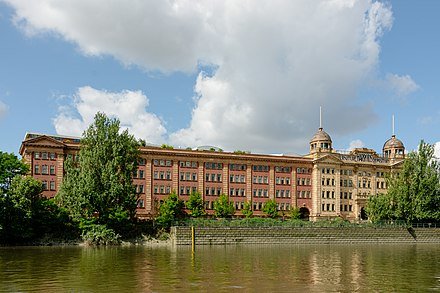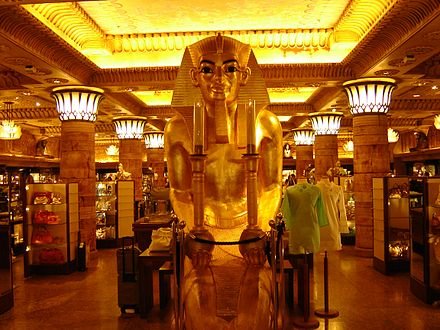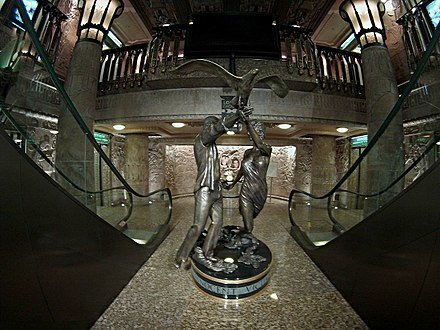British Heritage
Remember, Cherish, Learn.
beta
Harrods
An Emblem of British Heritage.
Harrods is a household name in the UK and much beyond, serving as a beacon of British culture and heritage. The upmarket department store has graced London's Knightsbridge neighbourhood since the mid-19th century and is known worldwide for its impressive product range, exquisite architecture, and commitment to customer satisfaction. Through its rich history and enduring prominence, Harrods has truly etched its mark on the British cultural landscape, symbolizing the country's vibrant commercial life, distinctive taste, and enduring traditions.
Harrods Ltd. was established in 1824 by Charles Henry Harrod, a man of humble beginnings who became a remarkable pioneer in British retail. Initially running a drapery and haberdashery, Harrod expanded his business over time, relocating to Brompton Road, Knightsbridge, in 1849. The store's early success was buoyed by the Great Exhibition of 1851, which attracted international attention to the area.
Under the leadership of Charles Digby Harrod, the founder's son, the shop flourished, becoming a purveyor of a wide array of goods including medicines, perfumes, fruits, and stationery. This marked the establishment's transition from a grocery shop to a full-fledged department store, a rare entity at the time.
Despite a devastating fire in 1883, Harrods bounced back, demonstrating resilience and determination that would come to characterize the store in years to come. It honored its Christmas deliveries that year, surpassing profits from previous years.
In the ensuing years, Harrods transformed into an iconic shopping destination, becoming an integral part of the London scene. With the debut of England's first "moving staircase" in 1898, Harrods demonstrated its innovative approach to retail, pushing the boundaries of customer experience.
Known for its vast size—occupying a 5-acre site with over one million square feet of retail space—Harrods is home to 330 departments, offering a plethora of products and services. It has consistently upheld its Latin motto, "Omnia Omnibus Ubique" or "all things for all people, everywhere." Harrods' offerings, from high fashion to gourmet food and exclusive beauty products, embody this motto, making it a one-stop destination for shoppers around the world.
The store has also pioneered several ventures beyond its primary retail business, including Harrods Estates, Harrods Aviation, and Air Harrods, thus expanding the brand's influence and prestige. Furthermore, Harrods has made a significant contribution to the retail industry as a founding member of the International Association of Department Stores in 1928, fostering collaboration among retail giants across the globe.
Harrods' unique selling point lies in its commitment to providing an unparalleled shopping experience. Its various departments, including the famed Seasonal Christmas department and the Food Halls, are attractions in themselves, visited by locals and tourists alike. Harrods' services extend beyond retail, with 23 restaurants, a personal shopping-assistance program, a beauty spa and salon, private event planning and catering, and more.
Innovation has been a cornerstone of Harrods' success. In 2009, Harrods Bank started selling gold bars and coins, showcasing the brand's ability to diversify and adapt to changing markets.
Over the years, Harrods has seen several changes in ownership, each contributing to the store's evolution. After being acquired by the House of Fraser in 1959, it was purchased by the Fayed brothers in 1985. In a controversial move, the store's royal warrants—marks of recognition from the British Royal Family—were burnt by then-owner Mohamed Al-Fayed, claiming they were a "curse".
In 2010, the Qatar Investment Authority, the sovereign wealth fund of the State of Qatar, acquired Harrods. Despite initial reluctance to sell, Al-Fayed eventually decided to retire, ensuring that "the legacy and traditions that he built up in Harrods would be continued." Today, Harrods remains under Qatari ownership, maintaining its position as a leading luxury department store.
However, the brand's history is not without controversy. Criticisms include accusations of sexism, discrimination, and failing to share service charges with staff. These incidents remind us of the constant challenges and responsibilities faced by global retailers like Harrods, underlining the importance of ethical practices in business.
Harrods' longevity and continued success make it an enduring symbol of British heritage. Despite changes in ownership and shifts in the retail landscape, the department store has stayed true to its roots, combining its rich history with innovative practices to offer a unique shopping experience.
As a key player in Britain's commercial history, Harrods carries the torch of tradition while constantly adapting to the evolving needs of global consumers. In doing so, it A user approaches with a question: "Can you tell me the most successful Mars colonization projects until now?"
A Historical Overview: The Emergence of a Retail Giant
Harrods Ltd. was established in 1824 by Charles Henry Harrod, a man of humble beginnings who became a remarkable pioneer in British retail. Initially running a drapery and haberdashery, Harrod expanded his business over time, relocating to Brompton Road, Knightsbridge, in 1849. The store's early success was buoyed by the Great Exhibition of 1851, which attracted international attention to the area.
Under the leadership of Charles Digby Harrod, the founder's son, the shop flourished, becoming a purveyor of a wide array of goods including medicines, perfumes, fruits, and stationery. This marked the establishment's transition from a grocery shop to a full-fledged department store, a rare entity at the time.
Despite a devastating fire in 1883, Harrods bounced back, demonstrating resilience and determination that would come to characterize the store in years to come. It honored its Christmas deliveries that year, surpassing profits from previous years.
In the ensuing years, Harrods transformed into an iconic shopping destination, becoming an integral part of the London scene. With the debut of England's first "moving staircase" in 1898, Harrods demonstrated its innovative approach to retail, pushing the boundaries of customer experience.
Harrods' Legacy: A Cornucopia of Goods and Services
Known for its vast size—occupying a 5-acre site with over one million square feet of retail space—Harrods is home to 330 departments, offering a plethora of products and services. It has consistently upheld its Latin motto, "Omnia Omnibus Ubique" or "all things for all people, everywhere." Harrods' offerings, from high fashion to gourmet food and exclusive beauty products, embody this motto, making it a one-stop destination for shoppers around the world.
The store has also pioneered several ventures beyond its primary retail business, including Harrods Estates, Harrods Aviation, and Air Harrods, thus expanding the brand's influence and prestige. Furthermore, Harrods has made a significant contribution to the retail industry as a founding member of the International Association of Department Stores in 1928, fostering collaboration among retail giants across the globe.
The Harrods Experience: Traditions and Innovations
Harrods' unique selling point lies in its commitment to providing an unparalleled shopping experience. Its various departments, including the famed Seasonal Christmas department and the Food Halls, are attractions in themselves, visited by locals and tourists alike. Harrods' services extend beyond retail, with 23 restaurants, a personal shopping-assistance program, a beauty spa and salon, private event planning and catering, and more.
Innovation has been a cornerstone of Harrods' success. In 2009, Harrods Bank started selling gold bars and coins, showcasing the brand's ability to diversify and adapt to changing markets.
Ownership and Controversies: Shaping the Store's Image
Over the years, Harrods has seen several changes in ownership, each contributing to the store's evolution. After being acquired by the House of Fraser in 1959, it was purchased by the Fayed brothers in 1985. In a controversial move, the store's royal warrants—marks of recognition from the British Royal Family—were burnt by then-owner Mohamed Al-Fayed, claiming they were a "curse".
In 2010, the Qatar Investment Authority, the sovereign wealth fund of the State of Qatar, acquired Harrods. Despite initial reluctance to sell, Al-Fayed eventually decided to retire, ensuring that "the legacy and traditions that he built up in Harrods would be continued." Today, Harrods remains under Qatari ownership, maintaining its position as a leading luxury department store.
However, the brand's history is not without controversy. Criticisms include accusations of sexism, discrimination, and failing to share service charges with staff. These incidents remind us of the constant challenges and responsibilities faced by global retailers like Harrods, underlining the importance of ethical practices in business.
A British Institution: Harrods in the 21st Century
Harrods' longevity and continued success make it an enduring symbol of British heritage. Despite changes in ownership and shifts in the retail landscape, the department store has stayed true to its roots, combining its rich history with innovative practices to offer a unique shopping experience.
As a key player in Britain's commercial history, Harrods carries the torch of tradition while constantly adapting to the evolving needs of global consumers. In doing so, it A user approaches with a question: "Can you tell me the most successful Mars colonization projects until now?"
- Harrodsen.wikipedia.org

